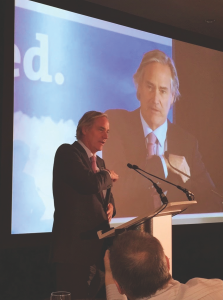 Coming off a very good year for hog producers in Manitoba, Michael McCain, head of Maple Leaf Foods says to move forward efficiently and successfully the industry needs balance.
Coming off a very good year for hog producers in Manitoba, Michael McCain, head of Maple Leaf Foods says to move forward efficiently and successfully the industry needs balance.
“A balance is about pigs and people and having the right balance in the industry with the right number of pigs born, marketing and processing the right number of pigs here in the province, in balance from one end of the chain to the other,” said McCain. “Right now we’re not in balance. We have neither enough pigs nor people to operate the capacity we have in place already today efficiently. We think that needs correcting.”
He quickly adds that doesn’t mean his company is advocating unbridled growth, it just means Maple Leaf needs to have enough supply and enough people to operate the assets on the ground today efficiently and effectively.
The challenges in the hog industry, not the least of them the almost four-year ban on hog expansion and the federal government’s changes of the Temporary Foreign Workers program making it almost impossible to get enough people to work their plants.
Is McCain confident going forward the industry can get enough barns and producers to regain confidence in the pig industry?
“I think the fundamentals are in place today to be able to accomplish that. Still many challenges that we have to work our way through,” he said. “That makes me hopeful that we can solve it but we still have to address those challenges.”
The Brandon Maple Leaf has the capacity to process 90,000 hogs a week, but currently processes only 70,000, idling capacity of 20,000 a week, or processing one million hogs per fewer a year.
He thinks it is in everybody’s interest to find the way to balance that shortfall, but will require roughly 175 barns, over how many years depends on many factors coming together.
Is he satisfied the province is acknowledging adequately and dealing with the issue of the shortfall in its new special permitting process? He believes so and also believes everyone is broadly supportive of the industry.
“I think everyone recognizes for this industry to be successful, it has to also be sustainable,” said McCain. “I think the framework is in place for responsible growth to achieve balance again we’re not advocating unbridled growth, we’re advocating an efficient industry that requires balance to accomplish that. We’re advocating and I think demonstrating that we support doing so in a sustainable and responsible way.”
When it comes to balancing people and pigs, McCain says most certainly the industry has more obstacles than support.
“We think Brandon, MB particularly, but Manitoba in general was one of the role model participants in the Temporary Foreign Worker program,” he said. “We had used that program to bring in over 1,000 people to Brandon, and over 800 of them today are permanent residents of Canada. That is something we should be proud of yes, the TFW program across the country from coast to coast, had issues and abuses, that needed correcting. Brandon, MB and Manitoba at large was not one of them.”
He says Maple Leaf and Manitoba have the need, the infrastructure, and managed responsibly, is an important component getting back to an efficient industry. In the meantime, Maple Leaf has done its best to support domestic recruiting programs, coast to coast, with some modest success.
McCain says the no industry, no processing systems needs to be the biggest to be the best, but it’s important to find the balance as an industry both in pigs and people.
“I have a great deal of confidence because it is an industry with enduring success, not without obstacles to deal with, but Manitoba and the Manitoba hog industry has always demonstrated its ability to overcome those obstacles. I think these will be no different.” •
— By Harry Siemens





